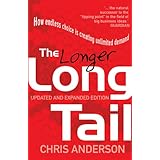I picked up this book randomly in Waterstones the other day, trying to use up the points on the gift card my work colleagues had thoughtfully bought me as a leaving present. I remembered hearing about the 'Long Tail' on the LISF module, and figured it would be relevant reading.
The idea of the Long Tail isn't new, and is probably old hat to most readers. This book is an updated version of Chris Anderson's 2006 original, but to be honest, I don't think there was much added between the two editions. Most of the information was pertinent to pre-2006, and this edition happens to be 2009, so it's still a little out of date. For instance - no mention of Twitter, Spotify, and other newer social media. Not even last.fm, come to think of it. The thing is, you don't really need to have those sites mentioned. Anderson gives you all the detail, and you just run with it. Really, you could read 'Twitter' for 'Facebook' and you'd still get the same idea. The theory of the Long Tail would still hold true.
And really, that's the only beef I have with this book. Much as I enjoyed it (and I tell you true, I did), most of it was repetition. After the first couple of chapters, you'd pretty much got the point and were ready to move on. There is a Long Tail for just about anything you can think of - music, movies, coffee, chocolate, beer, clothes, prams, cars, advertising. After finishing this book, you will be wondering what ISN'T affected by the Long Tail and finding yourself hard-pressed to find anything.
The thing is, once you know it, it's obvious. We all have niche interests. There's nothing amazing about that. It's just that, with the internet, we have been spoiled by the expansion of opportunities to indulge in those interests. Perhaps for the first time in history, people have had wide access to niche markets open up before them at the click of a mouse. In the past traditional 'bricks and mortar' stores have only concentrated on the hits and the bestsellers because they had no space for the rare and the obscure, and the hits were sure to sell and make a profit. Simple math. Anderson's point is that this paradigm is dying - because of the World Wide Web. Now the niche market constitutes a growing proportion of a company's overall profits - and it's continuing to grow. If you have enough buyers in any one niche market, you are still going to make a hell of a lot of money, even if only one unit is sold per annum.
(Incidentally, this is one of the things I enjoyed most about being in Japan, specifically Tokyo. Stores there heavily cater to Long Tail markets. Yellow Submarine serves the long tail of roleplay gaming; Mandarake serves the long tail of self-published fan comics; Book Off serves the long tail of second hand books, CDs, DVD's and videogames).
Some people have criticised Anderson for not getting the economics right in this book; I don't know much about economics, but I know enough from what being a Long Tail consumer myself informs me. There is no way I could've bought VS System cards a year after they'd been discontinued without access to specialist online stores such as the 13th Floor. Neither could I have found the hard-to-find beads and findings I was looking for unless I went to great expense to get them specially shipped - or bought them cheaply and conveniently at The Bead Shop. A whole new world has opened up for me and my interests through the internet; as has a whole new market been born for many businesses out there in the 'real world'.
So yeah. It's worth a read. Even if only to get your brain ticking over all the Long Tails it can possibly conceive of.


No comments:
Post a Comment